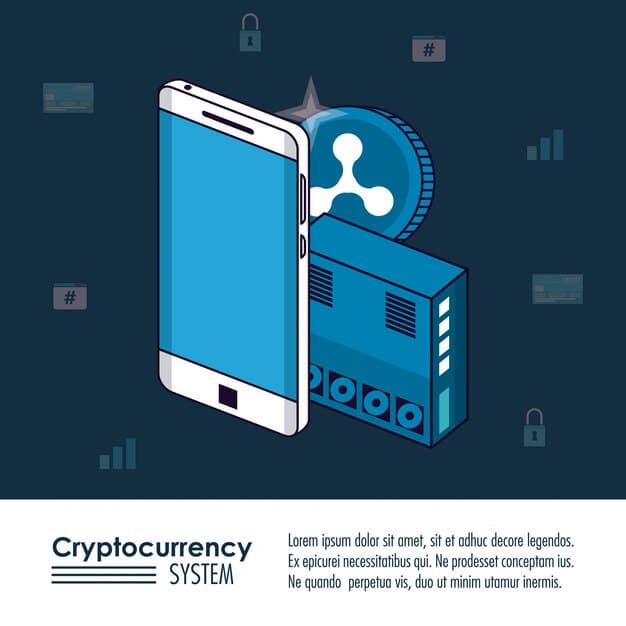DeFi Exploits: Protecting US Altcoin Investments from Security Risks

The surge in DeFi exploits poses significant risks to altcoin holdings, requiring US investors to adopt robust security measures such as diversifying wallets, using hardware wallets, and staying informed about the latest vulnerabilities and audits of DeFi platforms.
The decentralized finance (DeFi) landscape, while promising remarkable opportunities, is increasingly threatened by a surge in exploits. For US investors holding altcoins, understanding these threats and implementing robust security measures is crucial. This article delves into the nature of DeFi exploits and provides actionable strategies to safeguard your digital assets.
Understanding the Rising Tide of DeFi Exploits
The allure of high yields and innovative financial instruments has drawn many US investors to the DeFi market. However, this rapid growth has also attracted malicious actors, leading to a significant increase in exploits. Understanding the types of exploits is the first step in protecting your investments.
Common Types of DeFi Exploits
DeFi exploits come in various forms, each targeting different vulnerabilities within the decentralized ecosystem. Recognizing these patterns can help investors anticipate and mitigate risks.
- Flash Loan Attacks: Exploiting vulnerabilities in smart contracts to manipulate prices using uncollateralized loans.
- Reentrancy Attacks: Malicious contracts repeatedly calling a vulnerable contract before the initial execution is complete.
- Oracle Manipulation: Compromising data feeds to manipulate prices and execute fraudulent trades.
- Rug Pulls: Developers abandoning a project and making off with investors’ funds.
These exploits often result in substantial financial losses, highlighting the need for enhanced security measures. Staying informed about the latest attack vectors is critical for defending against emerging threats.

The anonymity and decentralized nature of DeFi make it challenging to trace and recover stolen funds. Therefore, proactive security measures are paramount.
Assessing Your Risk Profile as a US Investor
Before implementing security measures, it’s essential to understand your current risk profile. This involves evaluating the types of altcoins you hold, the platforms you use, and your overall investment strategy. By understanding your vulnerabilities, you can tailor your security approach to address specific threats.
Identifying Vulnerable Altcoins
Not all altcoins are created equal when it comes to security. Some may have unaudited smart contracts or smaller development teams, making them more susceptible to exploits. Here’s what to look for:
- Smart Contract Audits: Check if the altcoin’s smart contracts have been audited by reputable firms.
- Team Reputation: Research the development team’s experience and security track record.
- Community Involvement: A strong and active community often contributes to identifying and addressing vulnerabilities.
- Liquidity Levels: Low liquidity can make altcoins more vulnerable to price manipulation.
Understanding these factors can help you identify altcoins that may pose a higher risk of exploitation.
Conducting thorough research and due diligence can significantly reduce your exposure to vulnerable altcoins.
Implementing Robust Wallet Security Measures
Your wallet is your primary defense against DeFi exploits. Implementing robust wallet security measures is crucial to protect your altcoin holdings. This includes choosing the right type of wallet and following best practices for securing your private keys.
Choosing the Right Type of Wallet
The type of wallet you use can have a significant impact on your security. Consider the following options:
- Hardware Wallets: Physical devices that store your private keys offline, offering the highest level of security.
- Software Wallets: Applications installed on your computer or smartphone, offering convenience but lower security.
- Exchange Wallets: Wallets provided by cryptocurrency exchanges, the least secure option due to custodial risks.
For long-term storage of significant altcoin holdings, a hardware wallet is generally recommended.

Regularly updating your wallet software and enabling two-factor authentication can further enhance your security posture.
Best Practices for Securing Your Private Keys
Your private keys are the keys to your kingdom. Losing them or having them compromised can result in the permanent loss of your altcoins. To safeguard your private keys, follow these best practices:
- Store Offline: Keep your private keys offline, preferably on a hardware wallet or in a secure physical location.
- Backup Regularly: Create multiple backups of your private keys and store them in separate, secure locations.
- Avoid Sharing: Never share your private keys with anyone, including support staff or online services.
- Use Strong Passwords: Protect your wallets with strong, unique passwords and enable two-factor authentication.
Treat your private keys with the utmost care, as they are the only way to access and control your altcoins.
Regularly reviewing and updating your security protocols is essential for maintaining a high level of protection.
Staying Informed: Monitoring DeFi Platforms and Audits
The DeFi landscape is constantly evolving, with new platforms and protocols emerging regularly. Staying informed about the latest developments, vulnerabilities, and audits is crucial for protecting your investments.
Following Security Audits and Reports
Security audits are essential for identifying vulnerabilities in DeFi platforms. Look for platforms that have undergone audits by reputable firms and review the audit reports for potential risks.
- Check Audit Reports: Review the findings of security audits before investing in a DeFi platform.
- Monitor Security Updates: Stay informed about bug fixes and security updates released by DeFi platforms.
- Follow Security Experts: Keep up with the latest security news and insights from industry experts.
A platform’s commitment to security is a strong indicator of its long-term viability and trustworthiness.
Regularly monitoring the security practices of DeFi platforms can help you identify and avoid potential risks.
Diversifying Your DeFi Investments and Reducing Risk
Diversification is a fundamental principle of investing, and it’s equally important in the DeFi space. Spreading your altcoin holdings across multiple platforms and protocols can reduce your overall risk exposure.
Strategies for Diversifying Your DeFi Portfolio
Diversifying your DeFi portfolio can help you mitigate the impact of a single exploit or rug pull. Consider these strategies:
- Use Multiple Platforms: Distribute your altcoins across different DeFi platforms and protocols.
- Invest in Different Assets: Diversify your portfolio with a mix of different altcoins and DeFi tokens.
- Hedge Your Bets: Consider using stablecoins or other hedging strategies to protect against market volatility.
Remember that diversification doesn’t eliminate risk entirely, but it can significantly reduce its impact.
Regularly rebalancing your portfolio can help you maintain your desired level of diversification and risk exposure.
Utilizing Insurance and Risk Mitigation Tools
The DeFi market is inherently risky, and even the most careful investors can fall victim to exploits. Insurance and risk mitigation tools can provide a safety net and help you recover from potential losses.
Exploring DeFi Insurance Options
Several insurance protocols offer coverage for DeFi exploits and other types of losses. These protocols can provide financial protection in the event of a hack or bug.
- Nexus Mutual: A decentralized insurance protocol that offers coverage for smart contract failures.
- InsurAce: A multi-chain insurance protocol that covers a wide range of DeFi risks.
While insurance can provide peace of mind, it’s essential to understand the terms and conditions of the coverage. Be sure to read the fine print and ensure that the policy adequately protects your investments.
By taking proactive steps to protect your investments, you can navigate the DeFi landscape with confidence.
| Key Point | Brief Description |
|---|---|
| 🛡️ Wallet Security | Use hardware wallets and secure private keys offline. |
| 🔍 Audit Checks | Investigate if smart contracts are audited by reputable firms. |
| ➗ Diversification | Spread assets across different DeFi platforms. |
| ☂️ DeFi Insurance | Consider insurance for smart contract failures. |
Frequently Asked Questions (FAQ)
Common exploits include flash loan attacks, reentrancy attacks, oracle manipulation, and rug pulls. These exploits target vulnerabilities in smart contracts or data feeds.
Your wallet is your primary defense against exploits. A secure wallet, like a hardware wallet, ensures that your private keys are protected from unauthorized access.
Follow security audits, monitor security updates from DeFi platforms, and stay connected with security experts in the crypto space to stay updated.
DeFi insurance provides coverage against smart contract failures, hacks, and other risks. It can help investors recover losses in the event of an exploit on DeFi platforms.
Diversifying across multiple platforms and assets spreads the risk, so a single exploit doesn’t wipe out your entire portfolio, mitigating potential losses.
Conclusion
The surge in DeFi Exploits Surge: What Security Measures Can US Investors Take to Protect Their Altcoin Holdings? highlights the critical need for US investors to adopt proactive security measures. By understanding the risks, implementing robust wallet security, staying informed, diversifying investments, and utilizing insurance, you can navigate the DeFi landscape with greater confidence and protect your altcoin holdings.





